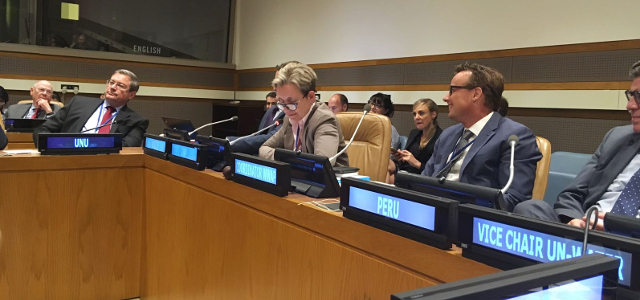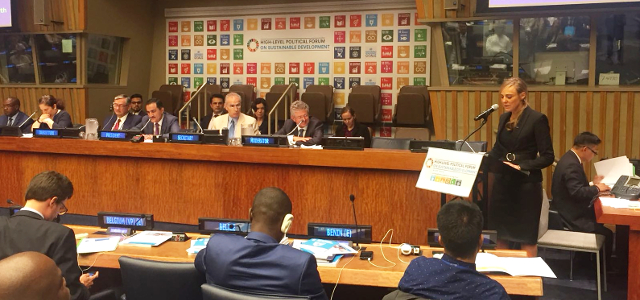From August 2017 to February 2018, GWP convened 34 country level consultations at the request of UN Environment, the UN’s custodian agency for SDG 6.5.1 – the indicator that measures the implementation of an integrated approach to water resources management (IWRM). The purpose of the consultations was to collect reliable data on that indicator.
In alignment with the principles of integration, the workshops brought together diverse stakeholders, including government, the private sector, and civil society. Participants discussed the status of water management in-country and completed the official SDG 6.5.1 questionnaire in a collaborative manner.
The baseline data collected by the workshops was included in UN-Water’s SDG 6 Synthesis Report on Water and Sanitation, the key document for the HLPF to assess progress on the goal. The data also highlights areas that countries will have to prioritize if they want to achieve the targets in SDG 6 by 2030. “We are not on track” was one of the key messages in the UN-Water report. Another – “Putting integrated water resources management (IWRM) into practice will be the most comprehensive step that countries make towards achieving SDG 6” – is one that affirms GWP’s mission.
UN-Water, until 14 September 2018, is seeking input from the public on the report’s findings.
Many interventions
On 9 July, Member States made interventions during the first official review of SDG6. GWP Executive Secretary Monika Weber-Fahr reported that five hours into the event, the room remained full, with 30 countries still wanting to comment, share progress, and challenges faced.

The Swedish UN Delegation stated that governance and inclusive processes are key to reaching SDG6, and that Sweden uses a source-to-sea approach to make this happen. Sweden’s conclusion was that in the long run the cost of inaction is much higher than that of action. The German UN Delegation said that reporting back every four years isn’t enough.
The Mexican UN Delegation cited the High Level Panel on Water Report – “Making Every Drop Count.” GWP convened several multi-stakeholder ‘Valuing Water’ consultations in 2017 as a contribution to that report. The report explicitly supports GWP’s four action areas to drive gender equality and social inclusion in water resource management taken from its Gender Action Piece (see Page 21 of the Report).
Freshwater Group Mexico, on behalf of the women’s groups, brought up the gender issue by stating that water stress is not always a function of scarcity, but rather caused by poor management. ‘The system we have is to approach water management as a technical problem, but it’s a political problem, and women’s participation is essential to find solutions.’
Financing was another subject of discussion, with the Kenyan UN Delegation saying that there are insufficient financial resources. The Indonesian UN Delegation asked Uganda and Peru for advice on innovative financing, with the Ugandan Delegation saying they tapped into blended financing and the Peruvian Delegation saying that their state invests in capacity at the local level.
GWP’s Steering Committee Member Mina Guli delivered a keynote and Weber-Fahr moderated a panel at a UN-Water/World Water Assessment Programme (WWAP) side event on the SDG 6 Synthesis Report.
On 11 July Weber-Fahr was on the panel of a side event on “Water and faith communities towards achieving SDG 6”, where the aim was to foster partnerships and showcase best practice between faith-based organisations and the water sector to achieve SDG 6.
July 13 marked the date for a Partnership Exchange session on “Building an effective monitoring framework system for partnerships.” Weber-Fahr presented what GWP has learned as a long-established partnership network as well as how the GWP network adds value to SDG implementation through partnership.
Photos: (top) Mina Guli delivering keynote speech and (middle) Monika Weber-Fahr moderating panel

